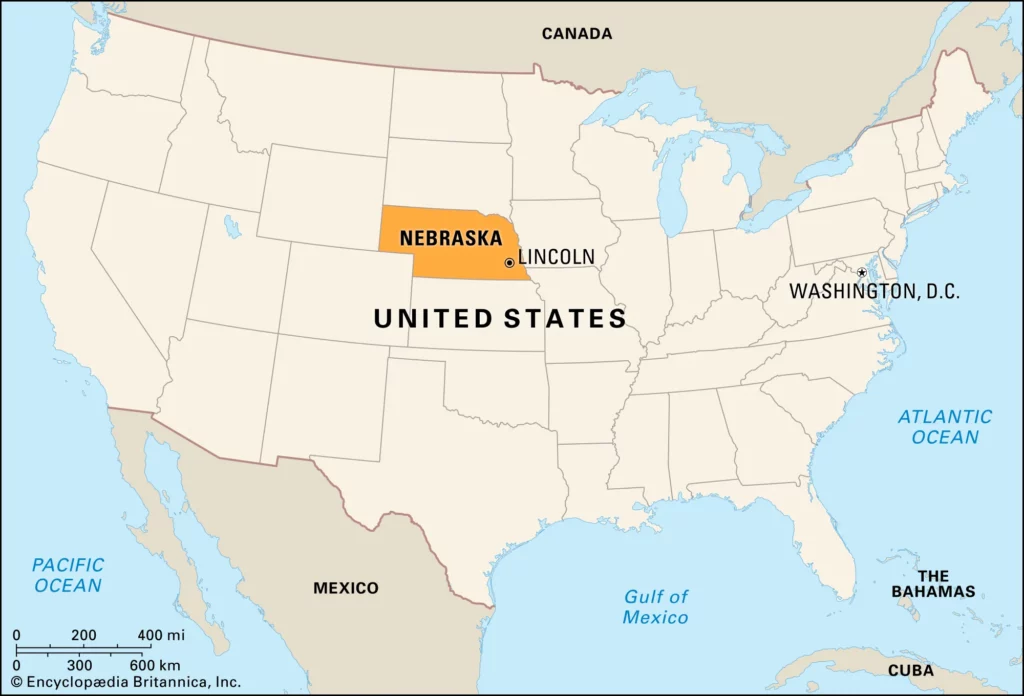
What is a Registered Agent in Nebraska?
In Nebraska, a Registered Agent serves as the official liaison between a business entity and the state. This agent is tasked with accepting legal documents, including service of process, tax notices, and official government communications, on behalf of the corporation, limited liability company (LLC), partnership, or any other legal entity registered with the state. The role of a Registered Agent is crucial for ensuring that the business maintains compliance with state laws and regulations.
Here are some essential aspects of Registered Agents in Nebraska:
Eligibility: A Registered Agent in Nebraska can be either an individual resident of Nebraska or a business entity authorized to do business in the state. The key requirement is having a physical address within Nebraska (not a P.O. Box) where they can receive documents in person.
Availability: The Registered Agent must be available at the registered office address during normal business hours to accept legal and official documents on behalf of the business.
Compliance Role: By ensuring timely receipt and response to legal and official documents, the Registered Agent plays a vital role in helping the business maintain its legal compliance and good standing with the state.
Public Record: The name and address of a business’s Registered Agent are part of the public record, accessible through the Nebraska Secretary of State’s office. This ensures transparency and accountability in the business environment.
Changing a Registered Agent: Businesses can change their Registered Agent by filing the appropriate form with the Nebraska Secretary of State and paying any required fee.
Becoming familiar with the responsibilities and requirements of a Registered Agent in Nebraska is essential for any business owner or entity looking to establish or maintain a business within the state.
How can I determine if my Nebraska business needs a Registered Agent?
In Nebraska, various factors determine whether your business needs a Registered Agent. Here are some key considerations to help you determine if your Nebraska business requires a Registered Agent:
Business Entity Type: If your business is registered as a corporation, limited liability company (LLC), limited partnership (LP), limited liability partnership (LLP), or any other formal business entity with the Nebraska Secretary of State, then you are required to have a Registered Agent.
Operating in Nebraska: If your business is formed in another state but operates in Nebraska as a foreign business entity, you must appoint a Registered Agent in Nebraska. This requirement ensures that your business can be legally contacted and served with official documents within the state.
Legal Compliance Requirement: The appointment of a Registered Agent is a legal requirement to maintain compliance with Nebraska state law. It ensures that there is a reliable point of contact for the state, legal entities, and other parties to communicate with your business.
If your business falls into any of the categories mentioned above, it is mandatory to designate a Registered Agent in Nebraska. The Registered Agent must have a physical address within the state (P.O. Boxes are not acceptable) and be available during normal business hours to receive legal and official documents on behalf of the business.
For certain business types, such as sole proprietorships and general partnerships that are not registered with the state, the specific requirement for a Registered Agent may not apply in the same way. However, if these businesses choose to register with the state for any reason, they will then be subject to the requirement to appoint a Registered Agent.
If you are unsure about the status of your business or whether your business activities necessitate a Registered Agent in Nebraska, it is advisable to seek legal advice or consult with the Nebraska Secretary of State’s office for personalized guidance applicable to your situation.
What does a Registered Agent do for a Nebraska business?

A Registered Agent plays a critical role in the operation of a Nebraska business by acting as an appointed intermediary between the business and the state. Here’s what a Registered Agent does for a Nebraska business:
Receives Legal Documents: The primary duty of a Registered Agent is to receive legal documents on behalf of the business, including service of process (lawsuits), subpoenas, and other legal correspondence related to litigation.
Accepts Official State Correspondence: Registered Agents are responsible for accepting official communications from the Nebraska Secretary of State, including compliance notices, renewal notifications, and other administrative documents.
Maintains Compliance: By ensuring that all important legal and state documents are received and managed properly, a Registered Agent helps a business maintain compliance with Nebraska state requirements, thereby aiding in preserving the company’s good standing.
Provides a Physical Presence: A Registered Agent must have a physical address (not a P.O. Box) in Nebraska where they are available during normal business hours. This requirement ensures that there is always a reliable way for the business to be contacted through their Registered Agent.
Offers Privacy and Discretion: Having a Registered Agent receive and handle sensitive legal documents provides a layer of privacy and discretion for the business owners, as lawsuits or legal actions are not served at the business’s primary location, potentially in front of customers or employees.
Given these responsibilities, the selection of a Registered Agent is an important consideration for any Nebraska business aiming to ensure legal compliance, smooth operations, and a reliable point of contact for essential correspondence.
Are there any legal requirements specific to Nebraska when selecting a Registered Agent for my business?
Yes, Nebraska has specific legal requirements that must be met when selecting a Registered Agent for your business. These requirements are designed to ensure that the state, legal entities, and others can reliably communicate with your business through your Registered Agent. Here are the key legal requirements for Registered Agents in Nebraska:
Physical Address: The Registered Agent must have a physical street address in Nebraska, known as the registered office, where they can receive documents in person. A P.O. Box or solely an electronic address is not acceptable.
Availability: The Registered Agent must be available at the registered office during normal business hours to accept legal documents and official communications on behalf of the business.
Eligibility: A Registered Agent in Nebraska can be an individual (who must be a resident of Nebraska) or a business entity authorized to do business in Nebraska. If a business entity is acting as the Registered Agent, it must have a place of business identical to the registered office.
It’s essential to comply with these requirements when selecting a Registered Agent for your Nebraska business to maintain good standing with the state. Failure to have a compliant Registered Agent can lead to legal and administrative repercussions, including the possibility of your business being dissolved by the state.
How often should a Nebraska business update its Registered Agent information?

A Nebraska business should update its Registered Agent information any time there is a change in the Registered Agent’s details or whenever there’s a change in the Registered Agent itself. There is no regular schedule or frequency (e.g., annually) for updating this information prescribed by law. Instead, updates should be made promptly to ensure the Nebraska Secretary of State and other interested parties have the correct contact information for serving legal documents and official communications.
Here are instances when you should update your Registered Agent information:
Change of Registered Agent: If you change your Registered Agent, you must file an update with the Nebraska Secretary of State to reflect this change.
Change of Address: If your Registered Agent moves to a new location, even if the agent remains the same, you must update the address with the state.
Change in Registered Agent’s Name: Any change in the name of the individual or entity serving as your Registered Agent (due to marriage, business name change, etc.) requires an update.
To update Registered Agent information in Nebraska, you typically need to file the appropriate form with the Secretary of State and pay any applicable fee. Ensuring that your Registered Agent information is current and accurate is crucial for maintaining your business’s good standing and ensuring that it does not miss any important legal or state communications.
What is the easiest way to get a Registered Agent in Nebraska?
Securing a reliable Registered Agent is a critical step for any business in Nebraska, ensuring compliance with state regulations and smooth handling of legal and official documents. The easiest and most efficient way to obtain a Registered Agent in Nebraska is through a professional Registered Agent service, and one standout option is FormPros.
FormPros offers a comprehensive Registered Agent service that is specifically designed to meet the needs of businesses at all stages of growth. Here’s why you might consider using FormPros for your Registered Agent needs:
Expertise: FormPros specializes in offering services tailored for businesses, including expert Registered Agent services that ensure compliance with Nebraska’s legal requirements.
Convenience: With FormPros, you can easily appoint or change your Registered Agent online, simplifying the process and saving you time.
Reliability: A professional service like FormPros ensures that your business will never miss important legal notices or documents, as they guarantee the presence of your Registered Agent during business hours to accept documents on your behalf.
Privacy: By using FormPros’ Registered Agent service, you can maintain a level of privacy for your business operations, as your Registered Agent’s address, instead of your business address, will be listed in public records.
Comprehensive Services: Beyond just offering Registered Agent services, FormPros can assist with a range of business needs, including entity formation and compliance filings, making it a one-stop solution for your business requirements.
Choosing FormPros for your Registered Agent needs in Nebraska not only ensures that your business remains in good standing, but it also provides peace of mind, knowing that your legal and official documents are being handled professionally. Utilize FormPros today to learn more about our Registered Agent services and how we can help streamline your business operations in Nebraska.
How do I change a Registered Agent in Nebraska?

Changing a Registered Agent in Nebraska involves a straightforward process, ensuring that your business continues to meet legal requirements for maintaining a Registered Agent in the state. Here’s a step-by-step guide on how to change your Registered Agent in Nebraska:
Select a New Registered Agent: Ensure that your new Registered Agent agrees to the appointment and meets all Nebraska legal requirements, including having a physical address within the state.
Obtain Consent: While Nebraska does not always require written consent from the new Registered Agent for the change, it’s best practice to have written agreement from the new Agent to act on your business’s behalf.
Complete the Required Form: Fill out the “Change of Registered Agent and/or Office” form. This form is available on the Nebraska Secretary of State website and can be used by corporations, LLCs, partnerships, and other business entities to update their Registered Agent information.
Pay the Filing Fee: There is a filing fee associated with changing your Registered Agent in Nebraska. Be sure to check the current fee on the Secretary of State’s website, as these fees can change.
File the Form: Submit the completed form and the filing fee to the Nebraska Secretary of State. This submission can typically be done online, by mail, or in person. Ensure you keep a copy of the form and any confirmation for your records.
After you have submitted the form and the fee, the Nebraska Secretary of State will process the change. It’s important to note that until the change has been officially processed, your previous Registered Agent will continue to be your legal point of contact.
Regularly updating your Registered Agent information as needed and ensuring that the information remains current is essential for complying with Nebraska law and ensuring your business receives important legal and state communications without delay.
Can I be my own Registered Agent in Nebraska?
Yes, in Nebraska, you can be your own Registered Agent for your business. This option is available to any business owner or individual who meets the specific requirements set by the state for Registered Agents. If you are considering this route, here’s what you need to know:
Physical Address: You must have a physical street address in Nebraska. This address, known as the registered office, cannot be a P.O. Box. It must be a place where documents can be physically received.
Availability: You must be available during normal business hours at the registered office to accept service of process and other legal and official documents in person.
Compliance: As your own Registered Agent, you are responsible for ensuring all legal documents and notices received are handled promptly and according to Nebraska law.
Being your own Registered Agent can offer benefits, such as saving on service fees that professional Registered Agent services charge and having immediate access to legal documents. However, it’s important to consider the responsibilities and potential drawbacks as well, such as the lack of privacy, since your address will be listed in public records, and the requirement to be available at the registered office during business hours.
If you choose to be your own Registered Agent, make sure you fully understand and are capable of meeting the legal obligations to ensure your business remains in good standing with the Nebraska Secretary of State.
Is it possible to appoint an out-of-state Registered Agent for your Nebraska business?
No, it is not possible to appoint an individual or entity located outside of Nebraska as your Registered Agent for a Nebraska-based business. Nebraska law requires that a Registered Agent maintain a physical street address within the state. This requirement ensures that the Registered Agent is always available to receive legal and official documents during normal business hours. Here’s what you need to know:
Physical Presence: The primary requirement for a Registered Agent in Nebraska is to have a physical presence in the state. This means having a physical location in Nebraska where documents can be served in person.
Compliance: A Registered Agent must comply with Nebraska’s statutory requirements, including the capability to receive documents during normal business hours and facilitate prompt communication with the business they represent.
However, if you’re considering an out-of-state business entity to act as your Registered Agent, it is permitted if that entity is authorized to do business in Nebraska and maintains a registered office (physical address) within the state that meets the above-mentioned requirements.
Choosing a Registered Agent who meets all of Nebraska’s legal requirements is crucial for maintaining your business’s good standing and ensuring that it doesn’t miss any important documents or notices. If you’re unsure about the compliance of a potential Registered Agent, it might be beneficial to consult legal advice or consider using a professional Registered Agent service that understands and adheres to Nebraska’s regulations.
Are Registered Agents from Nebraska Responsible for Any Fees or Taxes?

In Nebraska, Registered Agents themselves are not directly responsible for paying fees or taxes merely because they serve as a Registered Agent. However, there are certain aspects and scenarios related to the roles and responsibilities of Registered Agents and the businesses they serve that are important to consider:
Filing Fees: When a business appoints or changes its Registered Agent, it must file the appropriate form with the Nebraska Secretary of State and pay a filing fee. While the business is responsible for this fee, it’s associated with the Registered Agent’s information being updated in state records.
Annual Reports and Taxes: Businesses in Nebraska are typically required to file annual reports and may owe various state taxes. While the Registered Agent does not pay these taxes or file these reports, they may receive and forward these notices to the business. It’s the business entity’s responsibility to complete filings and pay any required taxes on time.
Service Fees: If a business uses a professional Registered Agent service, the business will pay service fees to the Registered Agent or their service company. These fees are for the services provided, including the use of the agent’s address as the official address for legal and state correspondence and for their availability to receive documentation on behalf of the business.
It’s crucial to understand that while Registered Agents play a significant role in ensuring that a business is in legal compliance and receives important documents, the financial obligations related to running the business, such as taxes and state fees, rest with the business itself. Registered Agents facilitate communication and compliance but do not bear these responsibilities.
Sign Up for a Registered Agent in Nebraska Now
State Specific Registered Agent Service
- Alabama
- Alaska
- Arizona
- Arkansas
- California
- Colorado
- Connecticut
- Delaware
- Florida
- Georgia
- Hawaii
- Idaho
- Illinois
- Indiana
- Iowa
- Kansas
- Kentucky
- Louisiana
- Maine
- Maryland
- Massachusetts
- Michigan
- Minnesota
- Mississippi
- Missouri
- Montana
- Nebraska
- Nevada
- New Hampshire
- New Jersey
- New Mexico
- New York
- North Carolina
- North Dakota
- Ohio
- Oklahoma
- Oregon
- Pennsylvania
- Rhode Island
- South Carolina
- South Dakota
- Tennessee
- Texas
- Utah
- Vermont
- Virginia
- Washington
- West Virginia
- Wisconsin
- Wyoming
Nebraska Registered Agent FAQs
-
What happens if my Nebraska Registered Agent resigns?
If your Registered Agent in Nebraska resigns, you'll need to appoint a new Registered Agent promptly. The state gives you a specific timeframe in which to do this, usually 30 days, to avoid potential penalties or risk of administrative dissolution of your business.
-
Can a Nebraska LLC act as its own Registered Agent?
An LLC in Nebraska cannot act as its own Registered Agent. Instead, an individual (such as a member of the LLC) or another authorized entity that meets Nebraska's requirements must be appointed.
-
Are there privacy concerns with being your own Registered Agent in Nebraska?
Yes, since the Registered Agent's address becomes part of the public record, serving as your own Registered Agent could impact your privacy. Using a professional Registered Agent service can help maintain personal address confidentiality.
-
Can a Nebraska Registered Agent accept mail on behalf of the business?
A Nebraska Registered Agent is primarily responsible for accepting legal documents. While they might incidentally receive other mail, their fundamental role is not as a mail forwarding service. Businesses should not rely on their Registered Agent for general mail collection.
-
What qualifications must one have to be a Registered Agent in Nebraska?
To be a Registered Agent in Nebraska, an individual must reside in Nebraska or, if the Agent is a business, it must be authorized to operate in Nebraska. All agents must have a physical address in the state where they can receive documents during business hours.
-
Is the information of the Registered Agent publicly accessible?
Yes, the name and address of your Nebraska Registered Agent are public records and are accessible through the Nebraska Secretary of State's office.
-
How can I verify the appointment of my Nebraska Registered Agent?
Once you've appointed or changed your Registered Agent and filed the necessary documentation with the Nebraska Secretary of State, you can verify the update through the state’s business entity search on their website, where the current Registered Agent information is listed.
-
Can a Nebraska Registered Agent refuse to accept documents?
A Registered Agent is legally obligated to accept service of process and other official documents on behalf of the business they represent. Refusing to accept such documents can result in legal and compliance issues for the business.
-
How often do I need to renew my Nebraska Registered Agent service?
If you're using a professional Registered Agent service in Nebraska, you'll typically renew your service agreement annually. This can vary based on the provider, so it's important to confirm the terms with them directly.
-
Is there a penalty for not having a Registered Agent in Nebraska?
Yes, failing to maintain a Registered Agent in Nebraska can result in administrative penalties, including fines and the potential for the state to administratively dissolve or revoke the registration of your business.
-
Can I change my Nebraska Registered Agent online?
Yes, in most cases, you can change your Registered Agent in Nebraska by filing the appropriate documents online through the Nebraska Secretary of State's website. There is typically a fee associated with this filing.
-
How do I resign as a Registered Agent in Nebraska?
To resign, you must submit a formal resignation through the Secretary of State. This typically involves filing a resignation form and providing notice to the business. Check the specific steps and possible fees on the Secretary of State's website.
-
Can a Nebraska Registered Agent reject their appointment?
Yes, if an appointed Registered Agent in Nebraska was not willing or aware of their appointment, they could file a rejection or resignation with the Secretary of State. However, businesses should always obtain consent prior to appointment to avoid such issues.
-
Is a lawyer required to serve as a Registered Agent in Nebraska?
No, there's no requirement for a Registered Agent in Nebraska to be a lawyer. Any individual or authorized entity that meets the state's requirements can serve as a Registered Agent.
 Rated 4.8 from 14,000+ Happy Customers
Rated 4.8 from 14,000+ Happy Customers

